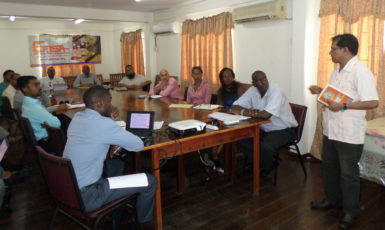Pressing for the suspension of the imposition of long unenforced import taxes on a range of raw materials, the Guyana Manufacturing and Services Association (GMSA) yesterday warned that consumers could soon be paying more for goods and services.
“It is imperative that manufacturers, and more importantly the purchasers of products, be cognizant of the fact that this requirement would result in higher prices for products and services. This decision has a direct impact on the ‘end users’ as products and services which they normally utilize would become more expensive,” GMSA President Eon Caesar was quoted as saying in a statement issued by the organisation after a stake-holders meeting yesterday.
Caesar has said that a suspension of the taxes would be sought and yesterday the organisation held the stakeholders meeting with its members as well as representatives of the Guyana Revenue Authority (GRA) and the Ministry of Foreign Affairs on how it would proceed.
“The GMSA is prepared to lead the process for a speedy resolution to the suspension of the import taxes as this situation can have dire consequences for Guyana’s Manufacturing, Business and Economic Sectors,” Caesar was quoted. “While this is our short-term approach, the GMSA is prepared to engage with the Ministry of Foreign Affairs’ Foreign Trade Department to achieve the long-term goal of reclassifying items ineligible for import tax exemptions under the revised Treaty of Chaguaramas,” he added.

Caesar had told Stabroek News on Wednesday that his organisation had been notified that the GRA was now enforcing import taxes on items ineligible for exemption, as outlined in the revised treaty.
The local manufacturing sector wants a continuation of the tax waivers granted under the former PPP/C administration until a mechanism is worked out to have a revision of the current agreement.
Caesar warned of dire consequences from the decision to apply previously unimplemented import taxes on a range of hardware, while Opposition Leader Bharrat Jagdeo called for a reversal of the decision. The affected items range from roofing sheets and wire that can be transformed into chain link fencing to cinnamon.
Minister of Business Dominic Gaskin told this newspaper on Wednesday that the government could not undertake such decisions by itself, as it has legal implications for the country because of obligations within the Caribbean Community (Caricom).
He said Guyana needs to work with Caricom to have a revised list of ineligible items that would see the raw materials needed by this country’s manufacturing sector, which cannot be accessed in the region, struck off the current list.
It is unclear what triggered the move to enforce the taxes, which have not been applied for decades.
Stabroek News was told that the decision was taken after a local company which manufactures some of the items for which no import taxes were being applied, complained to the government.
According to the statement issued after yesterday’s GMSA meeting, Caesar pointed out that as a consequence of the implementation of the taxes, while local manufacturers would be required to pay more for raw materials and face increased costs for their products, foreign competitors can continue to charge current rates for their products. “This is a significant issue for the local manufacturing sector as foreign competitors would be able to offer products at cheaper prices creating an uneven playing field,” he was quoted as saying.
Caesar said that the association has engaged the services of the GRA and the Ministry of Foreign Affairs to commence the process of applying for a suspension of the import taxes. He promised that the organisation will continue to work closely with both GRA and the Ministry of Foreign Affairs for a speedy resolution of the situation.
Gaskin has said that the former PPP/C governments have exposed the country to litigation from sister states by breaking the law instead of addressing the issue through Caricom. “It should have begun under the last government rather than trying to allow GRA to turn a blind eye to the laws and to our treaty obligations and expose us to all sorts of legal consequences. What they should have done was try to resolve the matter through the mechanisms that allow and are provided…,” he said.
Gaskin said government will be looking to the local manufacturing industry to provide a list of items that are not available in the region, in the quantities and specifications required. They will also work together to plan a way forward to address the issue.






